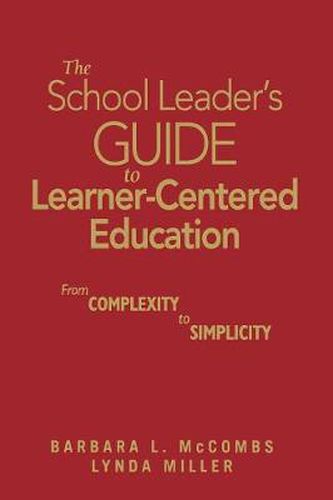Readings Newsletter
Become a Readings Member to make your shopping experience even easier.
Sign in or sign up for free!
You’re not far away from qualifying for FREE standard shipping within Australia
You’ve qualified for FREE standard shipping within Australia
The cart is loading…






In the context of the current accountability and testing era, many school leaders have become fearful and feel disenfranchised. Their knowledge and experience are not being validated, and often they are forced to engage in practices that go contrary to what they know will provide a positive school climate and culture for their staff and students. This book will introduce a model of leadership as part of a transformation process arising from a learner-centered system. Among the issues considered by educational leaders as the most pressing are: the relationship between moral leadership and school change (based on an ethic of responsibility for preparing all learners to function in a global world diversity: the role of school leaders to promote success for all marginalized groups of students; personalizing learning and authentically engaging students to make school more effective for all learners; and, incorporating learning standards and high expectations without sacrificing the personal and authentic engagement with students. This book addresses each of these concerns from the perspective of learner-centered systems, in which leaders distribute leadership among key constituents in the educational system - students, teachers, other school staff, parents, community members - and empower them to engage in a lifelong learning process of continuous growth and improvement. It also provides a detailed and comprehensive treatment of LCP, as well as helpful exercises and tools that can be applied to practice.
$9.00 standard shipping within Australia
FREE standard shipping within Australia for orders over $100.00
Express & International shipping calculated at checkout
In the context of the current accountability and testing era, many school leaders have become fearful and feel disenfranchised. Their knowledge and experience are not being validated, and often they are forced to engage in practices that go contrary to what they know will provide a positive school climate and culture for their staff and students. This book will introduce a model of leadership as part of a transformation process arising from a learner-centered system. Among the issues considered by educational leaders as the most pressing are: the relationship between moral leadership and school change (based on an ethic of responsibility for preparing all learners to function in a global world diversity: the role of school leaders to promote success for all marginalized groups of students; personalizing learning and authentically engaging students to make school more effective for all learners; and, incorporating learning standards and high expectations without sacrificing the personal and authentic engagement with students. This book addresses each of these concerns from the perspective of learner-centered systems, in which leaders distribute leadership among key constituents in the educational system - students, teachers, other school staff, parents, community members - and empower them to engage in a lifelong learning process of continuous growth and improvement. It also provides a detailed and comprehensive treatment of LCP, as well as helpful exercises and tools that can be applied to practice.